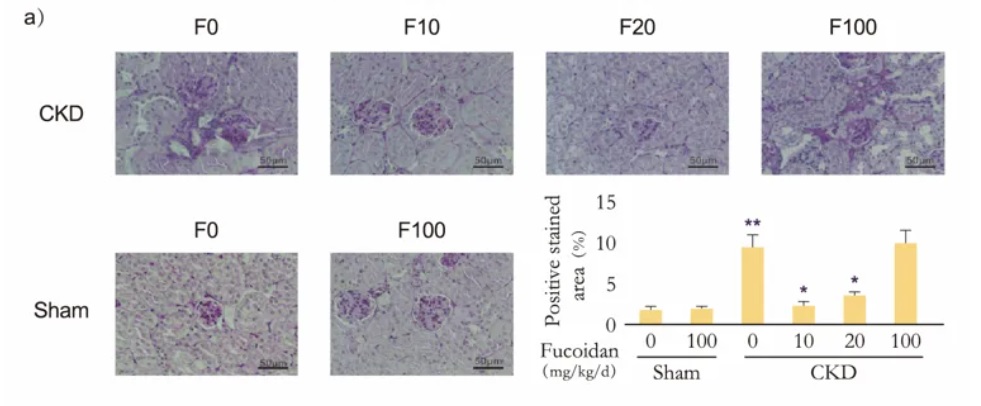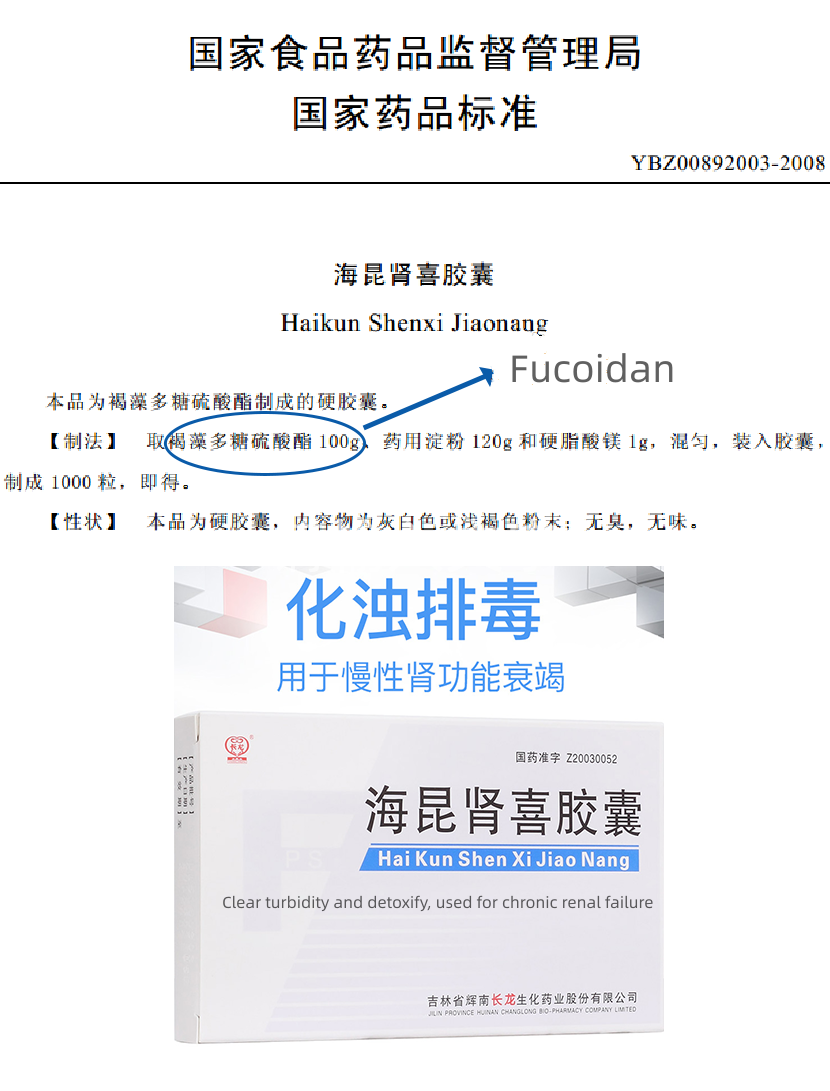
Fucoidan improves chronic nephritis
In the vast blue territory, the ocean not only breeds countless lives, but also contains rich natural resources. Among them, fucoidan, as a unique bioactive substance derived from the ocean, continues to step into the spotlight of scientific research. A large number of experiments have confirmed that fucoidan has extraordinary potential in improving chronic nephritis, nourishing the stomach, and improving immunity. Today, let us take a deeper look at fucoidan - improving chronic nephritis.
Kelp has been a plant that can be used as both medicine and food since ancient times. The Chinese use it as a traditional medicine to treat renal edema. Fucoidan is an important active ingredient from the mucus on the surface of kelp and has multiple physiological effects, including anti-inflammatory effects.
Current status of chronic nephritis in China
According to the latest epidemiological survey data, chronic kidney disease is very common in clinical practice. There are about 130 million chronic kidney disease patients in China. Chronic nephritis accounts for about 30%-40% of all chronic kidney diseases, with about 40 million patients.
Since chronic nephritis has an insidious onset and often has no symptoms, it is often ignored by everyone, delaying the best time for treatment. In this case, chronic nephritis may further develop into uremia. However, if timely intervention is made, the condition can be controlled and the progression of the disease can be delayed. Early detection and early treatment can prevent some patients from developing uremia throughout their lives.
Fucoidan improves chronic kidney disease (CKD)
The experiment studied the efficacy and mechanism of fucoidan on mice with chronic nephritis, and evaluated them from the indicators of serum urea nitrogen, serum creatinine, and related enzyme activities.
Experiment results: Fucoidan can effectively reduce serum urea nitrogen and serum creatinine concentrations in mice. Histopathology of renal tubules and renal interstitium shows that fucoidan can significantly improve the symptoms of chronic nephritis [1].
Conclusion: Fucoidan can effectively improve chronic nephritis and protect the kidneys. It is a potential marine drug for kidney protection.
Fucoidan improves renal interstitial fibrosis
Tubulointerstitial fibrosis is a determining factor of chronic nephritis. This study evaluated the inhibitory effect of fucoidan on tubulointerstitial fibrosis. Mice with chronic nephritis were given 10-100 mg/kg of fucoidan daily for six weeks, and the renal function and nephritis of the mice were observed.

Figure 1: Effects of fucoidan on tubulointerstitial fibrosis and nephritis in mice
Experiment results: The renal function of mice taking 100mg/kg fucoidan was significantly improved, and renal tubulointerstitialization was inhibited. Through mechanism studies, it was found that fucoidan can inhibit the expression of CD44, β-catenin and TGF-β proteins. expression, thereby inhibiting interstitial fibrosis and improving chronic nephritis [2].
Conclusion: Fucoidan has the activity of treating diabetic nephropathy and delaying chronic renal disease.
Fucoidan protects against kidney damage
Proteinuria is an important feature of chronic nephritis, which is associated with glomerular dysfunction, tubular lesions and interstitial damage. This study evaluated the effect of fucoidan on protecting renal tubular epithelial cells from damage caused by high protein in mice.
Experiment results: When the dosage of fucoidan is 100mg/kg, it can well alleviate kidney damage and renal dysfunction. Serum creatinine is reduced by 34%, urea nitrogen is reduced by 25%, creatinine clearance is increased by 48%, and urinary protein concentration is significantly reduced. [3].
Conclusion: Fucoidan can protect renal tubular epithelial cells from high protein-induced damage by inhibiting inflammation, fibrosis, oxidative stress and apoptosis. Fucoidan can be used as a potential drug for the treatment of chronic nephritis.
Fucoidan is a drug for treating chronic renal failure
[Haikun Shenxi Capsule]
In 2003, brown algae extract fucoidan (raw material, national medicine certificate Z20030090) and Haikun Shenxi Capsules (national medicine certificate Z20030089) respectively obtained new drug certificates issued by the China Food and Drug Administration and were launched on the market.

Clinical use in the past decade has shown that Haikun Shenxi Capsule has a good therapeutic effect on chronic kidney disease and is a commonly used drug for the treatment of chronic renal failure in my country.
Shandong Jiejing ocuses on High-Quality Fucoidan
At present, the research on fucoidan in improving chronic nephritis is becoming more and more perfect. It has great market development prospects in the fields of daily diet for kidney patients and therapeutic auxiliary functional food. It has no toxic side effects and is safer and more reliable.
Shandong Jiejing Group Corporation, as a well-known company in the global seaweed biological products, has been focusing on the in-depth development and application of seaweed resources for half a century. As a promoter in the field of fucoidan in China, Shandong Jiejing focuses on the research and development and application of fucoidan in various health fields. Jiejing fucoidan have a purity of up to 98%. The raw materials are selected from brown algae in clean and high-quality sea areas. The products are desalted, deodorized and deiodized, and the quality is reliable.
Resource:
[1]Journal of Ethnopharmacology 139(2012)807-813.
[2]Sci. Rep.7,40183; doi: 10.1038/srep40183 (2017).
[3]Journal of Molecular and Cellular Cardiology 97 (2016)169-179.
